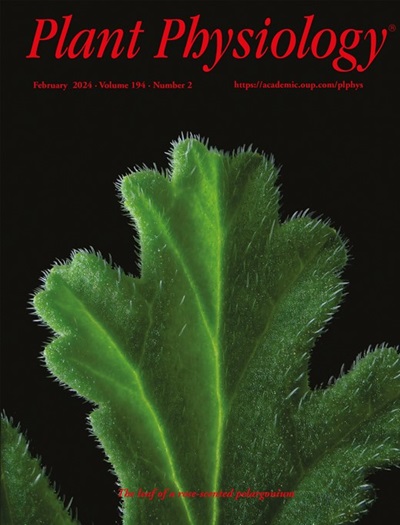The E3 ubiquitin ligase SCFLAO1 promotes NITRITE REDUCTASE degradation to modulate growth and oilseed production in Brassica napus
IF 6.9
1区 生物学
Q1 PLANT SCIENCES
引用次数: 0
Abstract
Efficient nitrogen utilization is essential for the survival and yield improvement of rapeseed (Brassica napus L.), an important oil crop. However, the mechanisms governing nitrogen responses and use efficiency in this species remain poorly understood. In this study, we identify BnLAO1 genes as repressors of nitrogen-stimulated growth and oilseed production in B. napus. BnLAO1 genes encode F-box proteins that associate with CULLIN1 (BnCUL1) to form intact SKP1/CULLIN/F-box (SCF) E3 ubiquitin ligases. BnLAO1 proteins are regulated by the autophagy pathway through their direct interaction with BnATG8A. Furthermore, we provide evidence that BnLAO1 proteins directly interact with and degrade NITRITE REDUCTASE (BnNiR), a pivotal enzyme in nitrogen assimilation. Interestingly, the homologue of BnLAO1 proteins in Arabidopsis, AtLAO1, does not interact with or degrade AtNiR. Finally, we demonstrate that the functional differences between BnLAO1 proteins and AtLAO1 are due to two amino acid mutations in BnNiR, which influence NiR recognition by LAO1 in plants. Collectively, this study elucidates BnLAO1 function within the regulatory network governing nitrogen utilization in B. napus, offering valuable insights for developing nitrogen-efficient crop varieties.E3泛素连接酶SCFLAO1促进亚硝酸盐还原酶降解,调节甘蓝型油菜的生长和油籽生产
油菜是重要的油料作物,氮素的有效利用对油菜的生存和产量的提高至关重要。然而,控制氮响应和利用效率的机制在这个物种仍然知之甚少。在这项研究中,我们发现BnLAO1基因是甘蓝型油菜氮刺激生长和油籽生产的抑制因子。BnLAO1基因编码与CULLIN1 (BnCUL1)结合的F-box蛋白,形成完整的SKP1/CULLIN/F-box (SCF) E3泛素连接酶。BnLAO1蛋白通过与BnATG8A的直接相互作用受到自噬途径的调节。此外,我们提供的证据表明,BnLAO1蛋白直接与亚硝酸盐还原酶(BnNiR)相互作用并降解,BnNiR是氮同化的关键酶。有趣的是,拟南芥中bnla1蛋白的同源物atla1不与AtNiR相互作用或降解AtNiR。最后,我们证明了BnNiR蛋白与atlae1蛋白之间的功能差异是由于BnNiR中两个氨基酸突变导致的,这些突变影响了植物中lae1对NiR的识别。综上所述,本研究阐明了BnLAO1在甘蓝型油菜氮素利用调控网络中的功能,为开发高效氮素作物品种提供了有价值的见解。
本文章由计算机程序翻译,如有差异,请以英文原文为准。
求助全文
约1分钟内获得全文
求助全文
来源期刊

Plant Physiology
生物-植物科学
CiteScore
12.20
自引率
5.40%
发文量
535
审稿时长
2.3 months
期刊介绍:
Plant Physiology® is a distinguished and highly respected journal with a rich history dating back to its establishment in 1926. It stands as a leading international publication in the field of plant biology, covering a comprehensive range of topics from the molecular and structural aspects of plant life to systems biology and ecophysiology. Recognized as the most highly cited journal in plant sciences, Plant Physiology® is a testament to its commitment to excellence and the dissemination of groundbreaking research.
As the official publication of the American Society of Plant Biologists, Plant Physiology® upholds rigorous peer-review standards, ensuring that the scientific community receives the highest quality research. The journal releases 12 issues annually, providing a steady stream of new findings and insights to its readership.
 求助内容:
求助内容: 应助结果提醒方式:
应助结果提醒方式:


